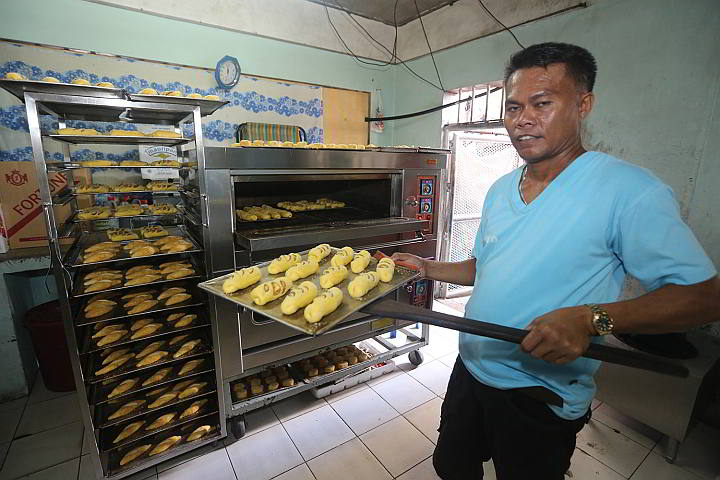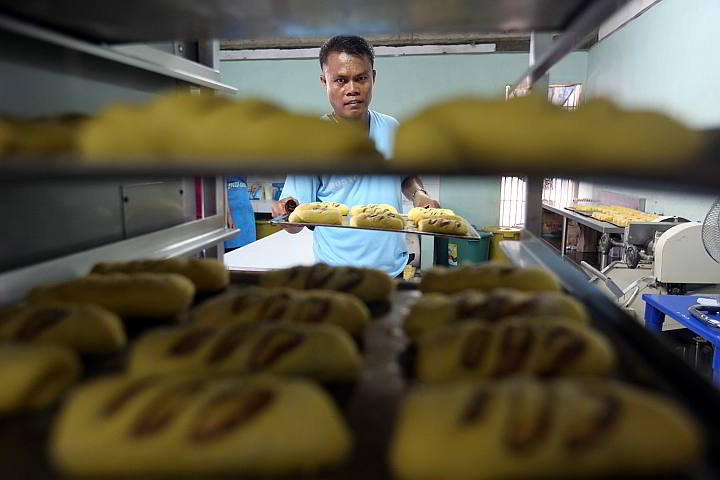
Inmate Lito Granada shows freshly baked bread from the jail’s oven for sale later in a self-service cafe run by inmates. (CDN PHOTO/TONEE DESPOJO)
While others mark time as they serve their sentence in jail, one inmate has found a way to use his time wisely and earn.
Lito Granada, 41, used his baking skills to make bread and eventually set up a bakery inside the Cebu Provincial Detention and Rehabilitation Center (CPDRC).
Granada started by preparing “shakoy” and “binangkal” for snacks three years back.
The jail’s bakery now produces 8 to 10 varieties of bread including hopia, pan de sal, jelly roll and cheese bread, which he and some inmates sell at the jail’s canteen and two Noy Honesto Coffee Shops in the Cebu Provincial Police Office (CPPO) and the jail’s main lobby.
“I am grateful that my skills as a baker were put to good use despite my being in jail,” said Granada in Cebuano.
He used to work as master baker of a prominent bakeshop chain in Cebu
The CPDRC bakery is a source of income for inmates and goes a long way in helping support their families outside the jail as well as purchasing day-to-day needs of inmates like shampoo and laundry soap.
An employees canteen run by a cooperative of the inmates is another source of income.
Granada said he thought of a livelihood program when he was named the jail’s mayor de mayores and cooperative head in 2011.
He is serving his 13th year of a 20-year sentence for rape, a crime Granada insists was a false charge.
A native of Tudela town in Camotes Island, Granada said he taught fellow inmates how to bake so they could have money to spend for their needs and prepare them to find jobs when they are released from prison.
Jail’s Bakery
With P2,000 as initial capital from the cooperative’s funds, he started by making “shakoy” and “binangkal” using a stove and a few kilos of flour.
When the operation expanded, he sought permission from jail officials to use an old oven that was lying idle in the jail’s storage area.
The inmates’ cooperative also bought a roller which they still use today.
They converted the old pantry into a bakery.
“I believe that having a supply of hot bread in prison helps,” Granada said in Cebuano.
He picked eight other inmates who either had experience as bakers or bakeshop trainees to help in the operation, working in two shifts daily.
Co-op Money
The bakery earns about P30,000 a month while the jail’s canteen earns another P40,000, he said.
The earnings are shared as allowances among the bakers and about 100 other inmates who do assigned chores as cleaners, kitchen assistants and errand boys.
“I give them an allowance so they can buy soap and shampoo, especially those inmates who don’t have visitors. At least, they can have something to use,” he said in Cebuano.
Part of the revenue is kept by the cooperative as a welfare fund for cash assistance of P500 to P2,000.
This goes to inmates who are hospitalized and need to buy medicine. The aid extends to immediate family members who get hospitalized.
Cash assistance is also given to inmates who enjoy home-visiting privileges for occasions like attending a relative’s vigil wake or those who are to be released so they have take-home cash.
While Granada still oversees the bakery, canteen and Noy Honesto Coffee Shop, he continues to look for ways to increase the cooperative’s revenues.
He said the bakery needs an additional oven, a mixer and slicer so they could increase daily production.
They also have to apply for a permit to operate a bakeshop in order to sell their products to stores outside of CPDRC.
Roberto “Bobby” Aboitiz, president of the Ramon Aboitiz Foundation, visited the jail last month. He promised to help the inmate’s co-op acquire additional equipment and process their permit.
Related Stories:
Making money by testing honesty
‘Pope dance’ by Cebu’s men in orange
Disclaimer: The comments uploaded on this site do not necessarily represent or reflect the views of management and owner of Cebudailynews. We reserve the right to exclude comments that we deem to be inconsistent with our editorial standards.

